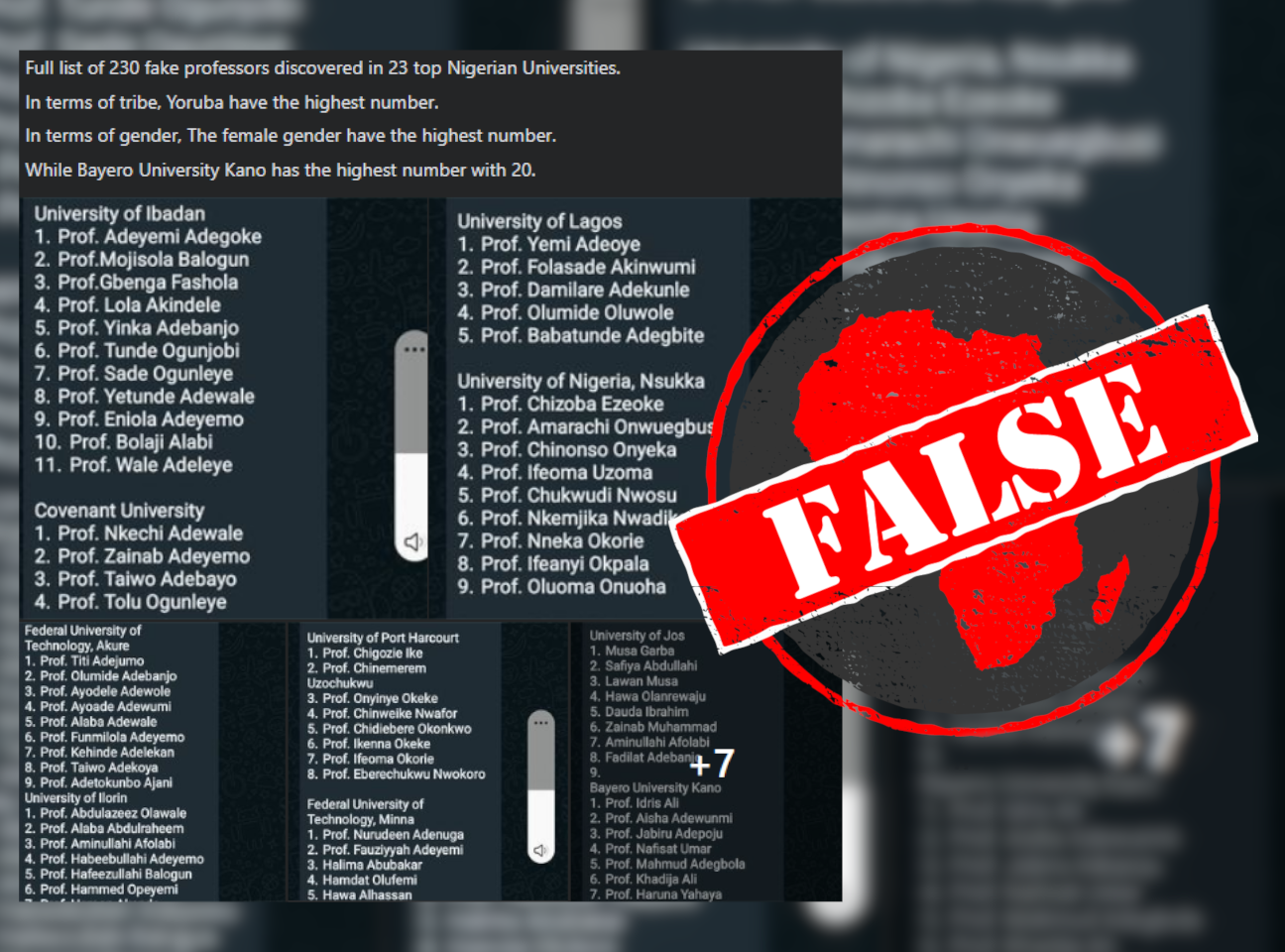IN SHORT: A message circulating on social media claims that Nigeria’s universities commission has discovered and listed 100 “fake” professors. But the claim is false and the list is fake.
A message circulating on WhatsApp and Facebook in Nigeria in early 2024 claims that the National Universities Commission (NUC) has discovered about 100 fake professors in the country’s university system.
The message includes screenshots that list the supposed fake professors. It reads: “Full list of 230 fake professors discovered in 23 top Nigerian Universities. In terms of tribe, Yoruba have the highest number. In terms of gender, The female gender have the highest number. While Bayero University Kano has the highest number with 20.”
The claim can be found here, here, here, here and here.
Some of the social media posts link to a report published by Channels TV, a leading national TV station, under the headline “About 100 Fake Professors Uncovered In Nigerian Universities – NUC”.
But what’s the full story here?

Related 2019 report doesn’t include a list
The Channels TV article was published in December 2019. Other media organisations also reported on the story in 2019, as can be seen here, here and here.
The reports say the claim came from a statement credited to Prof Abubakar Rasheed, who was the commission’s executive secretary then. The statement was published in the commission’s bulletin, according to the reports.
We found the bulletin dated 18 November 2019. It focused on a retreat the commission held with vice-chancellors of Nigerian universities.
The bulletin records that Rasheed asked the vice-chancellors to report “fake” professors in the universities.
The bulletin read: “The NUC Scribe disclosed that about 100 fake Professors’ details were posted on the website and the Commission had to send the names to the various universities for verification. He enjoined the Vice-Chancellors to delegate desk officers who would be responsible for checking the list of professors in their respective universities before uploading the same on the provided website. He stressed that the fight against fake professors was a collective responsibility.”
The reports however made no mention of the commission releasing a list of names and didn’t circulate any such list.
Debunked by the universities and the commission
Since the claim went viral in the first week of January 2024, most of the universities on the list have released official statements saying they have no “fake” professors and that the names listed on social media are not members of their staff. See some of the rebuttals here, here, here, here, here and here.
The commission’s acting executive secretary, Chris Maiyaki, also debunked the claim in an official statement:
The NUC wishes to deny these media reports categorically and unequivocally. They are fake, untrue and a figment of the imagination of the author(s), all happening at an unsuitable time, when the nation is awaiting the outcome of the investigation into the fake certificate saga from universities in some neighbouring countries.
Specifically, the fake news items have been circulating in two forms – (i) as a link to a 2019 online news item; and (ii) as a separate list of names of the alleged fake Professors in various Nigerian Universities, which was not the case.
We consider these unfounded publications as ill-conceived and a ploy by unscrupulous persons to create in plausible a tone, disquiet, panic and provoking outcries at both the national and international levels.
The statement said the issue resulted from a 2019 project in which the commission compiled and published a list of full professors in the Nigerian universities system.
Maiyaki said the NUC found anomalies during the exercise, such as associate professors being listed as full professors.
It then shared the collated data with the Nigerian universities “for the purpose of authentication by the competent authorities as to who qualifies to be a full professor.” He said the commission completed the verification in 2019.
Republish our content for free
For publishers: what to do if your post is rated false
A fact-checker has rated your Facebook or Instagram post as “false”, “altered”, “partly false” or “missing context”. This could have serious consequences. What do you do?
Click on our guide for the steps you should follow.
Publishers guideAfrica Check teams up with Facebook
Africa Check is a partner in Meta's third-party fact-checking programme to help stop the spread of false information on social media.
The content we rate as “false” will be downgraded on Facebook and Instagram. This means fewer people will see it.
You can also help identify false information on Facebook. This guide explains how.


Add new comment